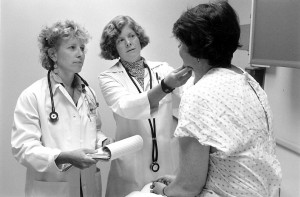
Desiree Basila was 52 when her stage zero breast cancer -- also called ductal carcinoma in situ -- was diagnosed. While her cancer was found very early, she was ultimately diagnosed with the disease in both breasts. In addition, it was found in several locations. For Basila, doctors said her only realistic treatment option was double mastectomy -- which Basila opposed. “If I die at 75 instead of 95 I think I can live with that," she told me recently. "I did not really want to have a double mastectomy."
Basila is strong evidence that individuals react differently to their treatment choices. The new healthcare buzzword is the engaged patient, generally referring to someone who is collaborating with doctors in the decision-making process and, conversely, where a patient's individual preferences are respected.
Basila became just such an engaged patient. After a cancer diagnosis, people usually have a few weeks to investigate treatment options, options that may be life altering. While Basila had little prior experience with cancer, she had been a science teacher and put her skills to use, digging into the research. She sought a second opinion at UC San Francisco and discovered a new research trial which appealed to her. Instead of double mastectomy, she enrolled in a trial on "Active Surveillance" of her slow-growing cancer. As part of the trial, she would go in twice a year for mammograms and she also received MRI images of her breasts once a year. “If it starts showing signs of aggression we can catch it and start more treatment at that point,” she said.
In addition to the trial, Basila had support from the Decision Services group at UCSF. There, a newly-diagnosed cancer patient can elect to work with specially trained interns. These interns are often recent college graduates on their way to medical school or other health professions. They help patients find and review accurate information, determine their priorities, and create lists of questions. An intern may also accompany a patient as a note taker during medical appointments.
Such strategies have been been shown to improve patients’ understanding of their cancer as well as their sense of engagement in their care. In a pilot program, [PDF] nine out of ten patients felt that the list of questions, concerns and expectations contributed to a more productive appointment with their doctor. Both patients and physicians reported satisfaction with these techniques.